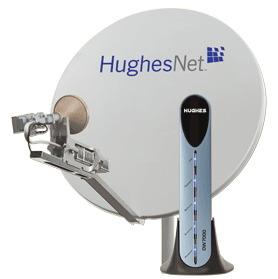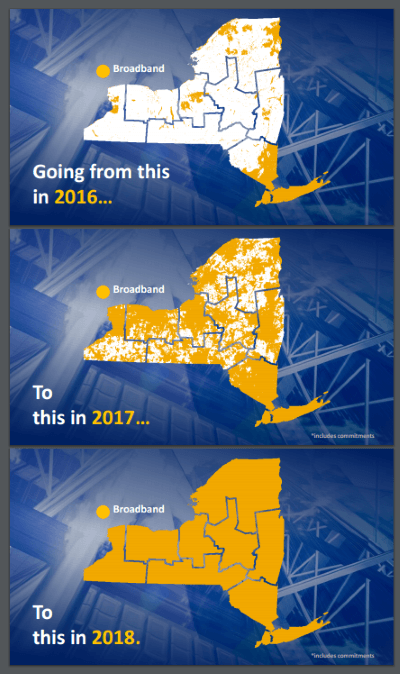 Tens of thousands of rural New York families were hopeful after Gov. Andrew Cuomo announced in 2015 his intention to bring true broadband to every corner of the state by the year 2018. At the time, it was the largest and most ambitious broadband investment of any state in the country, putting $670 million in lawsuit settlement money and rural broadband funds from the FCC on the table to build out rural broadband service other states only talk about.
Tens of thousands of rural New York families were hopeful after Gov. Andrew Cuomo announced in 2015 his intention to bring true broadband to every corner of the state by the year 2018. At the time, it was the largest and most ambitious broadband investment of any state in the country, putting $670 million in lawsuit settlement money and rural broadband funds from the FCC on the table to build out rural broadband service other states only talk about.
But for many rural New Yorkers, Gov. Cuomo’s program was a failure that could lock in substandard internet service (or no service at all) for years. What began as a 100% broadband commitment later evolved into 99.9% (then 98% in another estimate) after state officials learned $670 million was not enough to convince providers to share the cost of extending their networks to the most rural of the rural as well as those unlucky enough to live just a little too far down the road to make extending cable broadband worthwhile. But the governor proclaimed mission accomplished, and as far as the Cuomo Administration is concerned, the rural broadband issue has been resolved.
“There were a lot of tax dollars that were flipped and the governor has said, ‘Internet for everybody. Everybody will have internet.’ Well, that’s not the case. We’re not seeing that and those were his promises, not mine, but I voted for that money. A lot of other members did too,” Sen. Rob Ortt (R-North Tonawanda) told WBFO radio last year.
Ortt wants to know where the money is going and who exactly is getting it, and proposed legislation requiring annual reports from the Empire State Development Corporation detailing expenditures and disclosing the formula used to determine who gets true broadband service, and who does not.
For those not getting high-speed wireless or wired connections, the state has either offered nothing or dreaded satellite internet service, paying HughesNet $14,888,249 to supply discounted satellite equipment Hughes itself routinely discounts as a marketing promotion on their own dime.
For rural residents learning HughesNet was their designated future provider, many experienced with satellite internet over the last decade and hating nearly every minute of it, it was “thanks for nothing.”
“The governor pulled the rug right out from under us,” Ann told Stop the Cap! from her home near Middle Granville in Washington County, just minutes away from the Vermont border. “I have kids that require internet access to finish research and send in homework assignments. Internet service is not an option, and my kids’ grades are suffering because they have to complete homework assignments in the car or in a fast food restaurant or coffee shop that has Wi-Fi.”
Ann used HughesNet before, and canceled it because service went out whenever snow arrived in town.
“I thought the governor promised 100 Mbps service and HughesNet can’t even provide 25 Mbps,” she claims. “If you get 5 Mbps on a clear summer’s day, you are doing okay. In winter, reading email is the only thing that won’t frustrate you. It’s slow, slow, slow.”
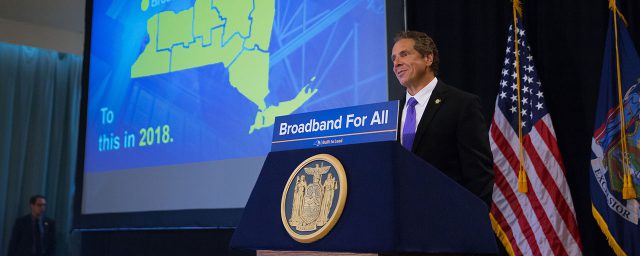
Gov. Andrew Cuomo announcing rural broadband initiatives in New York.
Nick D’Agostino brought his family to a new home an hour northeast of Syracuse when he got a new job. He was counting on the governor’s commitment to bring wired internet access to a home that used to have Verizon DSL, but no longer does after Verizon’s wired infrastructure deteriorated to the point where the company stopped offering the service to new customers like him arriving in the neighborhood. D’Agostino had to spend hours researching the state’s Broadband Program Office website to find out which provider was going to be supplying his census block (neighborhood) with 100 Mbps internet. He found HughesNet instead.
“It’s a kick in the pants because we have a lot of experience with HughesNet and Exede and neither came close to meeting their advertising claims,” he told Stop the Cap! “Exede was often unusable and a horrible company to deal with. HughesNet has a new ‘Gen 5’ service that is capable of DSL speeds, but comes with a low data cap and speed throttling.”
D’Agostino warns that New York made a terrible choice relying on satellite internet, even though HughesNet’s latest fleet of satellites has offered improvement over HughesNet a decade ago.
“The problem is HughesNet customers in a geographic area all share the same spot beam — a regionally targeted satellite signal that serves a specific state or region,” D’Agostino said. “When we lived in North Carolina, the population growth in rural areas meant a lot more satellite customers were sharing the same spot beam, and speeds plummeted, especially after Netflix, Hulu, and cord cutting took off. Nothing eats bandwidth like streaming video, which is why you can subscribe to their 50 GB allowance package and be over that limit after a single week.”
 D’Agostino fears that tens of thousands of additional satellite users will dramatically slow down HughesNet across upstate New York unless the company finds a way to get more shared bandwidth to serve the state’s rural broadband leftovers.
D’Agostino fears that tens of thousands of additional satellite users will dramatically slow down HughesNet across upstate New York unless the company finds a way to get more shared bandwidth to serve the state’s rural broadband leftovers.
“That usually means, ‘wait until the next generation of satellites are launched,’ something nobody should have to wait for,” D’Agostino said.
The obvious solution for D’Agostino is to convince Charter Spectrum, the nearest cable provider, to extend its lines down his street. The cable company agreed, if he paid an $88,000 engineering, pole, and installation fee.
“That is not going to happen, even if we got the dozen or so neighbors in our position to split the cost,” he said. “This is why Cuomo’s program is a flop. It turns out close to $700 million is not enough, and they probably always knew there would be people they could never economically serve because they are miles and miles from the nearest DSL or cable connection. But if the electric and phone companies are compelled to offer service, the same should be true for internet access.”
D’Agostino believes rural New Yorkers left behind need to organize and make their voices heard.
“They keep saying we are .1% of New York, but I’ve seen plenty of rural town supervisors and other local officials across upstate New York complain they have all been left behind, and that decision will cost their towns good education, jobs, competitive agribusiness, and services online that everyone assumes people can easily access,” he said. “Clearly the state is not telling the truth about how many are being internet-orphaned. There have been three rounds of broadband funding in New York. It is time for a fourth round, finding either tax breaks or funding to get existing providers to reach more areas like mine that are less than a mile from a Spectrum customer.”
Ann shares that sentiment, and adds that Vermont is looking for ways to get internet to its rural residents as well.
“We’re at the point where companies or co-ops already offering service are probably the quickest and easiest option to solve the rural internet crisis, but they are not going to pay to do it if they are not required to,” she said. “We have taxes and surcharges on our phone bill now that are supposed to pay for internet expansion, but the amounts are too small to get the job done I guess. Perhaps it is time to revisit this, because 99.995% is better than 99.9% and satellite internet should be the last resort for people living in a cottage miles from anyone else, not for people who can be in town in less than a five-minute drive.”
A familiar story for any rural resident trying to get internet access to their rural home. But there is a small silver lining. HughesNet’s newest generation of satellites has provided a modest improvement that is often better than rural DSL. (10:19)


 Subscribe
Subscribe Charter Communications’ ongoing settlement talks with the New York Public Service Commission are “productive” and will likely result in a final settlement agreement allowing Spectrum to continue operating in New York.
Charter Communications’ ongoing settlement talks with the New York Public Service Commission are “productive” and will likely result in a final settlement agreement allowing Spectrum to continue operating in New York.
 For 76,783 homes and businesses in upstate New York, the future of internet access will be a satellite dish and as little as a 20 GB data allowance per month, courtesy of the New York State Broadband Program Office’s decision to partner with HughesNet, a satellite internet provider, instead of finding a provider willing to extend wired internet access to every New Yorker.
For 76,783 homes and businesses in upstate New York, the future of internet access will be a satellite dish and as little as a 20 GB data allowance per month, courtesy of the New York State Broadband Program Office’s decision to partner with HughesNet, a satellite internet provider, instead of finding a provider willing to extend wired internet access to every New Yorker. “Definitely broken promises there,” Harte says.
“Definitely broken promises there,” Harte says.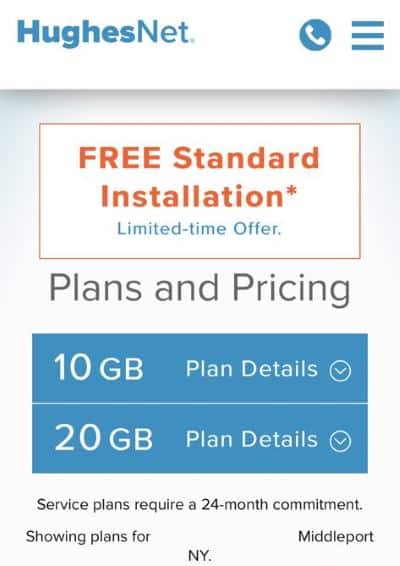
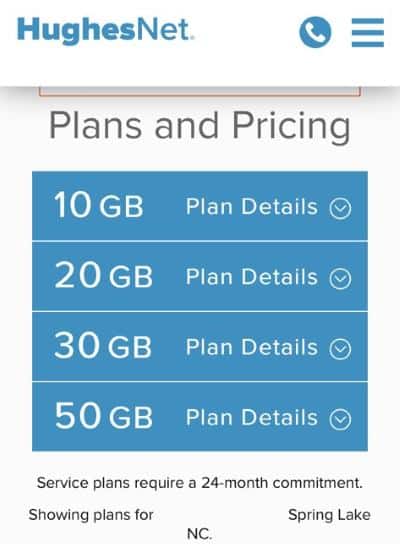
 HughesNet isn’t the only provider attracting crowds armed with pitchforks and torches. Frontier Communications, which was recently awarded $9.7 million to extend DSL service to 2,735 more rural customers in the Finger Lakes, Southern Tier and North Country, attracts scorn from its existing customers.
HughesNet isn’t the only provider attracting crowds armed with pitchforks and torches. Frontier Communications, which was recently awarded $9.7 million to extend DSL service to 2,735 more rural customers in the Finger Lakes, Southern Tier and North Country, attracts scorn from its existing customers.
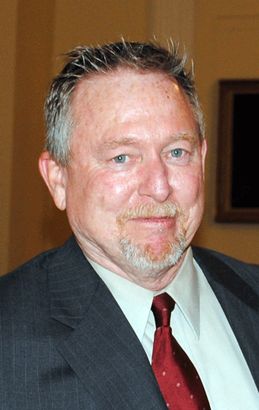
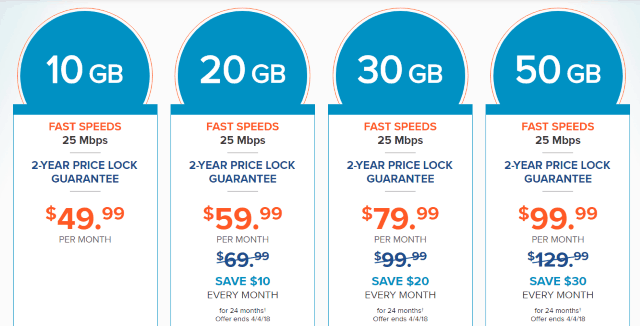
 “This is a huge disappointment for us,” Pat added. “We were counting on this happening. Told numerous times it would. Now we have to debate moving, we can’t continue not having internet. My oldest son just graduated high school never having internet at home.”
“This is a huge disappointment for us,” Pat added. “We were counting on this happening. Told numerous times it would. Now we have to debate moving, we can’t continue not having internet. My oldest son just graduated high school never having internet at home.”